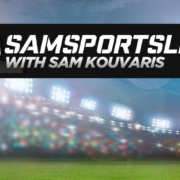No Basketball Jones Here
Good stuff for the past five days in Jacksonville for the NCAA first and second round games. Hard to imagine a better setting for four days of basketball and some R and R for fans. If you’re on the NCAA site selection committee, there are not too many better places for a visit in early March.
Mike Sullivan from the city and Joel Lamp from JU did very good work in setting up and organizing the Arena, the games, and all of the logistics. Except for one electrical snafu where part of press row lost power on Thursday, things seemed flawless surrounding the entire event. So good in fact, that they’re going to bid for the first and second round in 2009 or 2010. The bid goes in front of the committee in April with the announcement coming in July.
The NCAA has very specific rules about what happens at each venue. When I walked into the Veterans Memorial Arena it was a somewhat surreal experience. I kept thinking I was somewhere else but I was in my hometown at the NCAA’s! Sounds hokey I know, but it’s pretty amazing to think that Jacksonville was able to host the first and second round of the tournament without some kind of over bearing effort that taxed everybody and everything in town. It was just another thing that happened.
Unthinkable as little as five years ago.
Florida’s appearance here after winning the SEC tournament certainly added to the excitement, but the tournament was sold out even before the Gators were selected to play here. There was enough excitement and enough buzz around the event to sell it out just as an event. Fans came from all over the country, following their teams and in some cases just looking for a new place to see the NCAA’s.
A friend of mine was visiting from Long Island and came down on Southwest. If you’ve flown Southwest, you know they’re a little goofy and one of the flight attendants asked how many people on the flight were headed to “the basketball.” About 25 people raised their hands and none were headed to see a particular team. Just coming to town to see “the basketball.”
The crowds impressed me. Not necessarily the size, because you see empty seats all over the country, especially at first round games. But by the conversations and the enthusiasm I saw at every turn around the arena. People were into it. They didn’t know UW-Milwaukee from the University of Mars, but they were interested in what the Panthers could do. Of course I also saw every Gator fan, regular or otherwise inside the Arena at the two games. Some I see at basketball games in Gainesville. Others couldn’t name two players on the team outside of Joakim Noah. But that’s OK. I never mind band-wagoner’s. The more the merrier.
Florida fans’ obsession with football actually is an obsession with winning. And Billy Donovan has brought winning to the court in Gainesville. The Gators are headed to Minneapolis for the Sweet 16 and perhaps beyond. They’re good enough to keep winning, but they’re young and things can go awry with a young team quickly. Either way, it was fun when the Gators were here.


